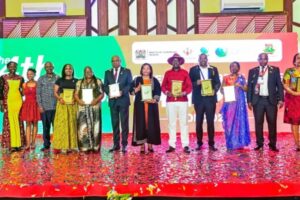[ad_1]
When Elizabeth Kalas completed her education at Loiyangalani Primary School in Marsabit County in 2017, the 350 marks she scored were a source of pain instead of joy.
Though she had done well in the Kenya Certificate of Primary Education (KCPE) exam, braving the difficult environment on the shores of Lake Turkana, she had little hope of joining high school.
Raised by a herdsman and a housewife, Kalas’ only hope of joining high school rested on Equity Bank’s Wings to Fly scholarship programme – and she worked hard to be the best girl in a class of 26.
Unfortunately, she came out second-best girl in her class, shuttering her dream of securing the only scholarship fund she knew of.
When she received her admission to Pangani Girls High School in Nairobi, Kalas did not attempt to download the admission letter because she knew she would not go to high school anyway.
No effort
“My parents did not see any value in taking me to high school. They did not make any effort to try. I was destined to become a herder and marry early like most of my neighbours,” she lamented.
Kalas, an alumna of Bishop Gatimu Ngandu High School, courtesy of the Kenya Drylands Education Fund (KDEF), an organisation that supports the education of children from pastoral communities, says this is the predicament most of her classmates faced.
“In 2017, more than 46 candidates wrote the KCPE exam at Loiyangalani Primary School. In fact, there were 26 girls and 20 boys in the class, but only less than 10 girls have made it through secondary school. On the contrary, most of the boys went to high school. Lack of value for education and a retrogressive culture are a major setback,” she said.
Scored a B-
Kalas, who scored a B- (Minus) in the 2020 Kenya Certificate of Secondary Education (KCSE) exam, now aims to become the first lawyer from Loiyangalani and inspire more residents to pursue higher education.
While more children are joining primary schools in Marsabit and Samburu counties, KDEF co-founder and director Ahmed Kura said, the biggest challenge is moving on to secondary school and institutions of higher learning.
Mr Kura notes that girls are hit hardest by the low transition rate to high school in pastoralist communities.
Data on access to education from the 2019 census shows that the gender parity gap in Marsabit widened as learners transitioned to the next level.
In Marsabit there were 10,355 boys and 10,352 girls in pre-primary, and 41,996 boys and 40,365 girls in primary school, but the gap widened in secondary school, where 18,352 learners were male and 12,075 were female.
The 2019 census also shows that over 4,000 males made it to college against 2,800 females, while out of 4,611 who went to university, only 1,300 were females.
Scholarship fund
Mr Kura, a resident of Laisamis in Marsabit, says he established the scholarship fund to increase access to secondary school education and to higher learning in the region.
“Marsabit and Samburu have some of the highest illiteracy levels in the country. We offer full scholarships to bright and needy children who are joining high school. Our focus is largely on girls, a majority of whom do not make it to secondary school,” he said.
This year, KDEF has offered 52 scholarships to learners from Marsabit and Samburu, including more than 30 girls who were likely to end up as herders.
Mr Kura said that besides offering scholarships, the organisation is also establishing boarding facilities for girls to ensure they remain in school.
Marsabit Deputy Governor Solomon Gubo said the county government established a scholarship fund that has benefited more than 700 children.
His Samburu counterpart Julius Leseeto said the scholarships will go a long way in addressing illiteracy in the region.
[ad_2]
Source link



















